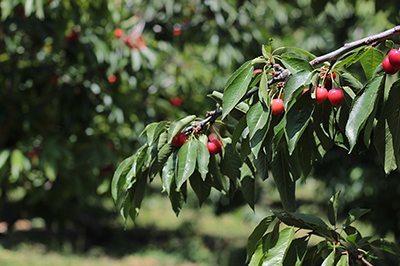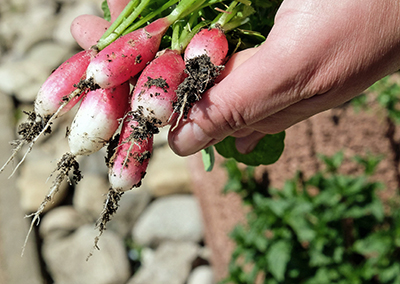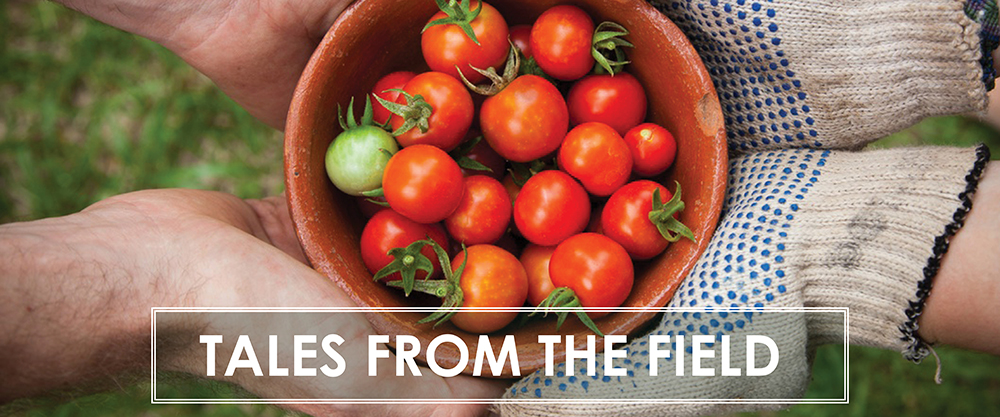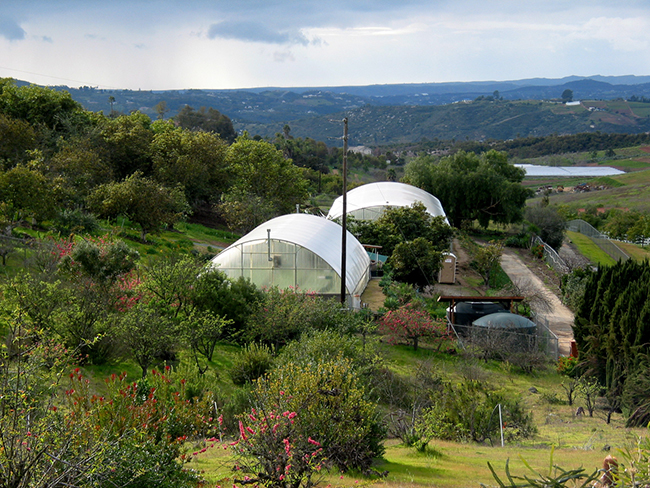After leaving active duty, many veterans are faced with the decision of “where to go from here” and for those involved in active combat, a healing process is often involved in this transition. Attention has been placed in recent years on teaching veterans farming skills, not only to provide a viable career option but also therapeutic relief from past experiences. Recently the Office of Farm to Fork partnered with Archi’s Institute for Sustainable Agriculture to support veterans learning farming skills through their Organic Agribusiness program. Students follow a rigorous 6 or 12 week schedule learning the details of growing fruits and vegetables organically and hydroponically.
Students chosen by the Office of Farm to Fork will share their stories and the journey many like them are taking to create a new career path in farming after leaving the military in three blog posts here on Tales from the Field. Many of the students are exploring niche markets in California by developing business plans to grow less traditional fruits and vegetables or to support often overlooked populations.
Michael Lupacchino
My military experience and training in procurement and acquisitions and data mining taught me to understand the concepts of business entrepreneurship, statistics and mathematics. I will also bring the discipline and mental agility learned from the military and apply it to start a thriving hydroponics business. Recently I have searched for various career opportunities because I will retire from the US Army in 2017. The Department of Agriculture is offering enticing incentives for veterans to become farmers. I would like to continue to serve this country, and I believe that hydroponics farming is one way for my family and I to continue serving this country.
I chose the bitter melon for my business plan because I see the potential for economic benefit for the farmer. By targeting niche neighborhoods and businesses that use the bitter melon, one can make this plant a profitable crop. Because I’m Filipino, I know how hard it is to find a constant supply of fresh bitter melon in commercial supermarkets in the United States. The Bitter Melon is a beautiful plant with deeply lobed leaves and eye-catching fruit that shifts from green to yellow to orange as it ripens. The taste is an acquired one for people in the United States. However, Filipinos and Asians love the taste of this plant. Some people say that it is more bitter than an unripe grapefruit or very dark chocolate. Acquiring a taste and love for the bitter takes a while if you are not used to it but after a while, don’t be surprised if you become addicted to this melon’s strong flavor.
My original farming goal was to establish a dragon fruit farm that provides a form of healing for Veterans suffering from severe traumatic brain injuries and/or post traumatic stress disorder (PTSD). My original intent was to show the viability of growing dragon fruit in California, which would benefit the industry as a whole, and my efforts would show veterans the healing benefits of farming that would in turn help the community. However, this has changed. Through my studies, I have learned multiple things.
The first and most important is that having a therapy farm, which in a sense is a “u-pick farm,” will not allow me to raise enough crops to sell. Having frequent and multiple “visitors” will wreak havoc on the land, bringing in outside contaminants that I cannot control, which will be detrimental to my crops. In order to balance the cash flow issue, I plan to raise bee colonies for fruit and vegetable pollination. Bees are in huge demand and require a small amount of real estate. By having several colonies, this will also help to pollinate my crops. I plan to have the colonies on one side of my farm and the therapy section on another.
In addition to the importance and need for beekeeping, I have discovered an additional niche that I plan to take advantage of – seedlings. From my studies, I have learned that raising seedlings is a very labor-intensive process, which many farmers do not have the time to grow for themselves. My current idea is to open two “mini-farms”- #1 bee colonies #2 seedling mass production. Having the two “mini-farms” will allow me to raise capital, which will help to fund the PTSD Therapy farm.
Joe Laguna
 I grew up in Salinas Valley the son of a trucker that hauled fresh produce to market. This background in farming explains why through my 20 years in the Navy I always had some sort of garden going wherever home was. In the past 5 years gardening has become more of a passion, which is always driving me to better myself. Just this summer my garden was so productive my family and neighbors could not keep up, so we started selling our produce at our local farmer’s markets. I have learned so much from my market experience I know I have to take this opportunity to a higher level and the knowledge, experience and partnership I will gain from my studies at Archi’s Acres will truly benefit not only myself and my family, but also the community by sharing with them more about the specialty crops of fruits and vegetables – how healthy they are and how to best grow them. We plan to have peach, apple, oranges, apricot and cherry trees to start with.
I grew up in Salinas Valley the son of a trucker that hauled fresh produce to market. This background in farming explains why through my 20 years in the Navy I always had some sort of garden going wherever home was. In the past 5 years gardening has become more of a passion, which is always driving me to better myself. Just this summer my garden was so productive my family and neighbors could not keep up, so we started selling our produce at our local farmer’s markets. I have learned so much from my market experience I know I have to take this opportunity to a higher level and the knowledge, experience and partnership I will gain from my studies at Archi’s Acres will truly benefit not only myself and my family, but also the community by sharing with them more about the specialty crops of fruits and vegetables – how healthy they are and how to best grow them. We plan to have peach, apple, oranges, apricot and cherry trees to start with.
Alyssa Ponce
 With experience of 5 years of early mornings and late nights in the military as a Food Service Specialist I’m well aware of hard work. I am in my last year of my Bachelor’s Degree in Business Administration with a concentration in Human Resource Management and Entrepreneurship from National University and it has provided me with a tremendous amount of information I can carry over to my farming needs.
With experience of 5 years of early mornings and late nights in the military as a Food Service Specialist I’m well aware of hard work. I am in my last year of my Bachelor’s Degree in Business Administration with a concentration in Human Resource Management and Entrepreneurship from National University and it has provided me with a tremendous amount of information I can carry over to my farming needs.
I hope to represent and help communities establish community garden areas and expand them throughout Southern California for communities with little to no backyards. My project will benefit the specialty crop industry by creating awareness and increasing nutrition literacy to provide an easy way for communities to become more involved in living a healthier life. To help develop programs and include community gardens for neighborhoods with apartment complexes with little to no backyard I would collaborate with the governor’s office of planning and research to update general plan guidance to include food access considerations and zoning recommendations. By informing the communities of what they can and can’t do with flyers, social media and word of mouth it can help with the confusion most communities have. By creating a guideline and answering community questions it can stir more conversation rather than not doing anything at all.
Working closely with these communities and local agencies we can expand on existing programs and broaden new ones. Not only would specialty crops help communities but connect and collaborate diverse groups and inform the public to avoid confusion and bridge the gap between communities and farmers. This connection will benefit the community and industry as a whole.
This post is part of a series featuring Farm to Fork Ambassadors from Archi’s Institute for Sustainable Agriculture. Students chosen by the Office of Farm to Fork share their stories and the journey many like them are taking to create a new career path in farming after leaving the military in three blog posts here on Tales from the Field. Many of the students are exploring niche markets in California by developing business plans to grow less traditional fruits and vegetables or to support often overlooked populations.



